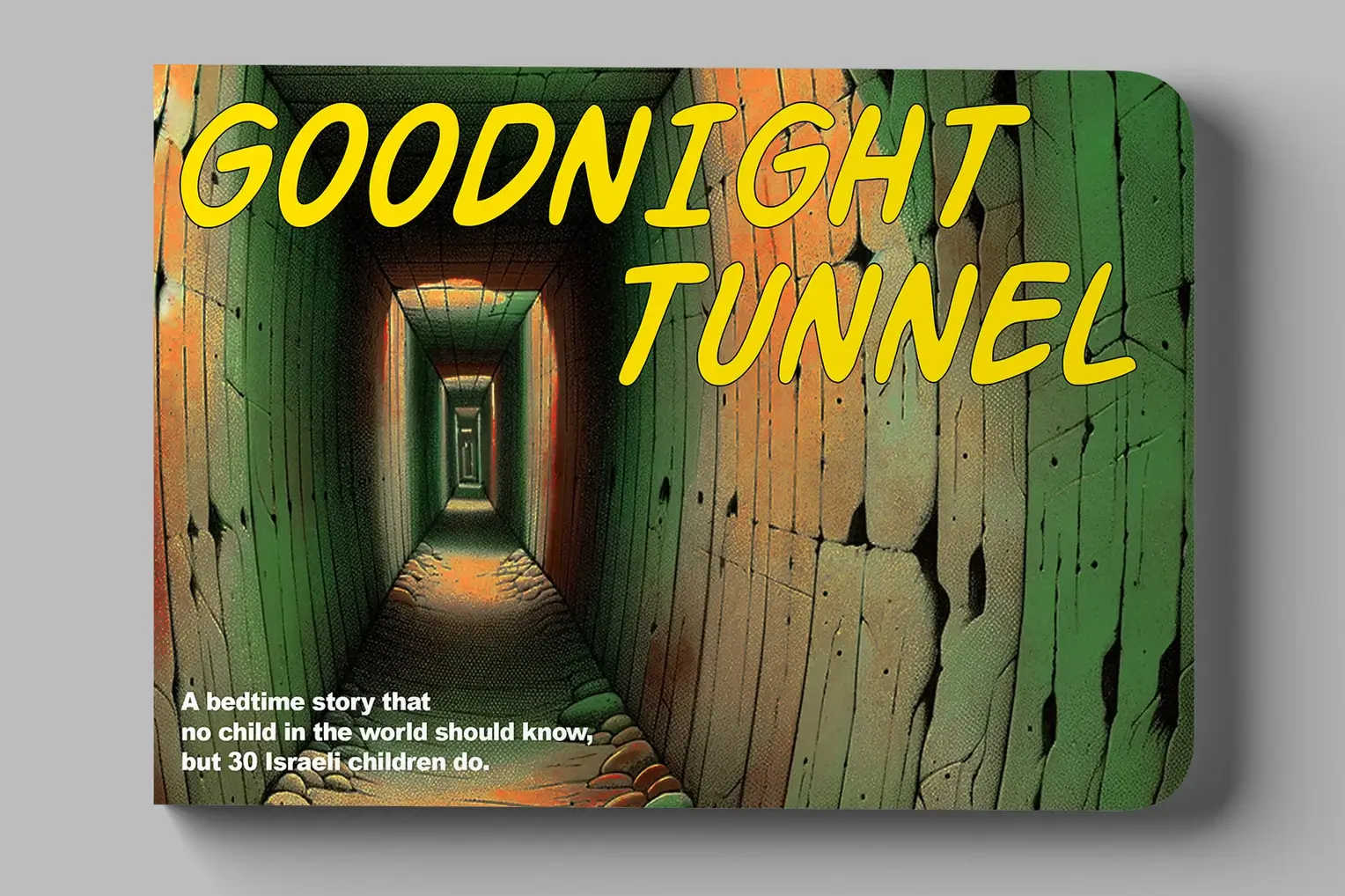‘Goodnight Tunnel’ reimagines ‘Goodnight Moon’ with bedtime terrors for children kidnapped by Hamas
Book and video designed to spur pressure for hostages’ release tell the ‘saddest bedtime story ever written’

Goodnight Tunnel reimagines the children’s classic Goodnight Moon with bedtime terrors for the children kidnapped by Hamas. Courtesy of blanco agency
It’s being billed as “a bedtime story that no child in the world should know.” Goodnight Tunnel is a chilling version of Goodnight Moon that imagines the terrifying ordeal of the 30 children kidnapped by Hamas.
Those young hostages, taken along with more than 200 adults in Hamas’ Oct. 7 attacks on Israel, include a 10-month-old baby and seven little ones under the age of 5.
Where the classic 1947 picture book by Margaret Wise Brown bids goodnight to kittens, mittens and a red balloon, Goodnight Tunnel says goodnight to tears and fears, gun and stone, sandbag and mud.
“Goodnight rope,” the narrative continues, with a stark image of a coiled rope tied into a figure eight. “Goodnight to the fading hope.”
Spurring international pressure
Goodnight Tunnel was produced in English by Israel’s Blanco advertising agency in order “to engage with a broad international audience,” the creators said, and “spur international public pressure for the release of these children.” There is no Hebrew-language text. A video of the story is also narrated in English in a deep, calm voice by Israeli actor Alon Abutbul.
The simple, mostly black-and-white graphics include a drawing of a couple embracing a child with the words, “Goodnight longing for mom and dad.” Next, a child is pictured standing at the foot of an endless ladder. “I want to go home but I don’t know how,” the child says. “Help me end this nightmare now.”
The hostages were taken by Hamas gunmen who murdered 1,400 people as they rampaged through kibbutzim and a music festival. Some of the children were abducted after seeing their parents murdered in front of them; others were kidnapped along with a sibling or adult relative.
The Oct. 7 attacks have led Israel to wage a retaliatory war on Gaza that the Gaza Health Ministry says has killed more than 10,000 people, including thousands of children. It’s presumed that Hamas is keeping the hostages alive in tunnels.
‘Who kidnaps children?’
Daniel Bnaya, chief creative officer of the Blanco agency behind Goodnight Tunnel, said that while Goodnight Moon shows a bunny saying goodnight “to the playful items in his room, our protagonist must say goodnight to the grim realities of their confinement — a gun, the mud, tears and fears.”
As a father, he added, “the prospect of one of my daughters enduring the horror of being alone in an underground tunnel in Gaza, detained by Hamas terrorists, is a scenario more harrowing than any nightmare I could imagine.”
The hostages have made headlines around the world. Interviews with their surviving family members are heart-rending.
“Who kidnaps children? Where in the world is that the right thing to do?” Maayan Ziv, mother of two captive girls, Ella Elyakim, 8, and Dafna Elyakim, 15, asked reporters in despair.
Another mother, Hadas Kalderon, whose 16-year-old daughter Sahar and 12-year-old son Erez, were taken, said that she “can hear every night my son screaming to me, mom, save me.”
Posters advertising the captives’ plight have become a source of conflict outside Israel, with supporters of Israel putting the posters up and supporters of the Palestinian cause tearing them down.
A message from our CEO & publisher Rachel Fishman Feddersen
I hope you appreciated this article. Before you go, I’d like to ask you to please support the Forward’s award-winning, nonprofit journalism during this critical time.
At a time when other newsrooms are closing or cutting back, the Forward has removed its paywall and invested additional resources to report on the ground from Israel and around the U.S. on the impact of the war, rising antisemitism and polarized discourse.
Readers like you make it all possible. Support our work by becoming a Forward Member and connect with our journalism and your community.
— Rachel Fishman Feddersen, Publisher and CEO